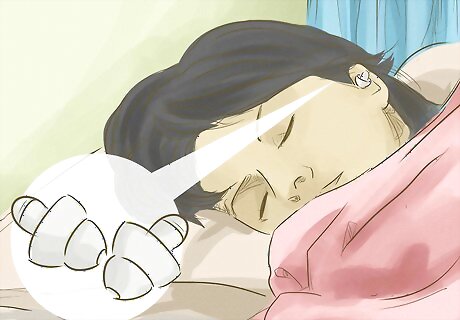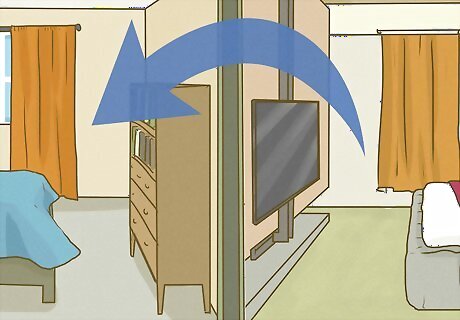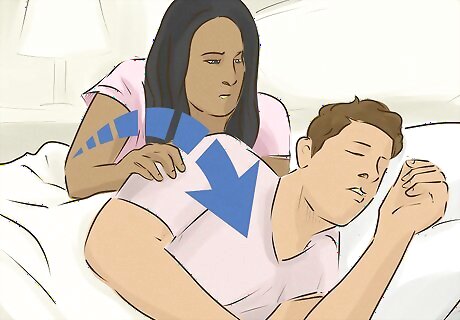
views
Blocking the Noise

Use earplugs. This tried and true method is cheap and easy. Look for earplugs at a pharmacy or department store and pop them in at night to block out some of the unwanted sounds. Earplugs come made from different materials, such as foam, rubber, and plastic. Make sure to follow the instructions on your package to figure out how to place your earplugs in effectively. If you are prone to ear infections, ask your doctor before using ear plugs. To reduce the risk of infection, always wash your hands before handling the earplugs and clean reusable earplugs regularly. Don’t push them too far into your ears and make sure that you can hear smoke detector and carbon monoxide alarms while you are wearing the earplugs in case any emergency arises.

Find a source of white noise. White noise is the kind of background noise made by television static or a fan--easily ignorable, but soothing at the same time. A good source of white noise can help cancel out the most stubborn of snorers. You can turn on a fan, an air conditioner, or another electronic device that makes white noise. You can also invest in a white noise machine, which you can purchase online. If you can't find a source of white noise, look for videos or audio clips online that can provide it.

Listen to music on your headphones. If you have headphones and a device like an iPod or iPhone, you’ve already got your own personal noise-cancelling device. Play some relaxing music to block out the sound of snoring and help you nod off at night. Opt for slow, soothing music. Louder, faster music, though effective at drowning out snores, may make it even more difficult to sleep. If you have an account on a website like Spotify, see if you can find any playlists specifically designed to help with sleep.
Dealing with Sleep Interruptions

Cope effectively when snoring wakes you. If you are woken up by snoring in the middle of the night, don’t get frustrated--that will make it even harder to get back to sleep. Instead, help yourself relax with some soothing, repetitive tricks. Do not check the time on your phone. Not only might this frustrate you (“It’s 3 in the morning?!”), but the bright light from your phone could make you even more alert. Instead, try closing your eyes and taking a few deep, soothing breaths. Think about channeling the air into your lower abdomen rather than your stomach.

Change how you think about the sound. If you think of snoring as an annoyance, it is more likely to bother you. Try to think of the sound as a soothing noise that can lull you to sleep. This may help you remain calm when you wake up in the middle of the night. Try to listen closely to snoring and pay attention to its rhythm. The very source of your troubles can actually help you fall back asleep. It may take some practice before this method works, so have patience. It may be awhile before you learn to embrace the sound of snoring. Meditating quietly can be a great way to block out noise.

Consider moving to a different room. If you can't fall back asleep, try moving to a different room. If you have a guest room, sleep there. You can also try sleeping on the sofa for a night. If you're in a romantic relationship with someone who snores, it may help to arrange to sleep in different rooms at least some nights of the week. Snoring can be an embarrassing habit, so be gentle with your partner or whoever you’re sharing the room with. Explain that a couple good nights of rest will have you energetic enough to help them stop snoring for good!
Reducing Your Partner's Snoring

Have the snorer sleep on their side or stomach. Sometimes, shifting sleeping positions can help reduce snoring. If the snorer sleeps on their back, this can lead to an increase in snoring. Encourage them to sleep on their side or stomach instead. Just this simple change could relieve their snoring woes.

Discourage the snorer from drinking before bed. Drinking alcohol, especially in excess, can relax the throat muscles, causing snoring or worsening it. Politely ask the snorer not to drink before bed, especially if you have something you need to do in the morning. If you do this gently, they’ll be happy to lay off to help you rest. If the snorer does drink before bed, encourage them to do so only in moderation, such as one small drink instead of three.

Use nasal strips. Try slipping these strips of paper over a snorer’s nose before bed to reduce snoring. Grab some at your local pharmacy and give this minimally-invasive trick a try. If sleep apnea is causing snoring, nasal strips will not be effective.

Raise the head of your bed. Raising the head of your bed just four inches can help reduce snoring. Lift the head of an adjustable bed frame or try propping the snorer's head up with extra pillows.
Seeking Medical Help

Have the snorer use decongestants to address snoring. Stuffed noses can cause or worsen snoring, so have your snorer use a decongestant spray or medication before bed. Make sure to get sprays specifically designed for nighttime use, since daytime sprays meant to be used may not be as effective in combatting snoring.

Encourage the snorer to talk to a doctor about quitting smoking. We know that smoking can cause a number of health problems, and snoring is one of them. Ask the snorer to look into quitting smoking for their health--and your sleep schedule! A doctor may recommend things like nicotine gum or a nicotine patch to gradually ease your partner off tobacco. They may also recommend support groups in the area or online to help the person quit.

Have the snorer see a doctor to rule out underlying conditions. You may be dealing with a chronic snorer whose noisy nighttime breathing might be caused by an underlying medical condition like sleep apnea. Head to your doctor to rule out or diagnose underlying issues. The doctor may want to do X-rays or other scans to check for problems in the airway. A doctor may want to conduct a sleep study. This can be done at home by your partner reporting sleep issues. The snorer also may spend a night in the hospital for doctors to observe their sleep.

Explore treatment options with the snorer. If the snorer is diagnosed with a specific condition, treatment for that condition can help with snoring. Treatments depend on the condition, but could involve using a sleep mask to help with nighttime breathing. If there is a problem with the snorer's throat or airway, in rare cases surgery may be used to correct the issue.

















Comments
0 comment